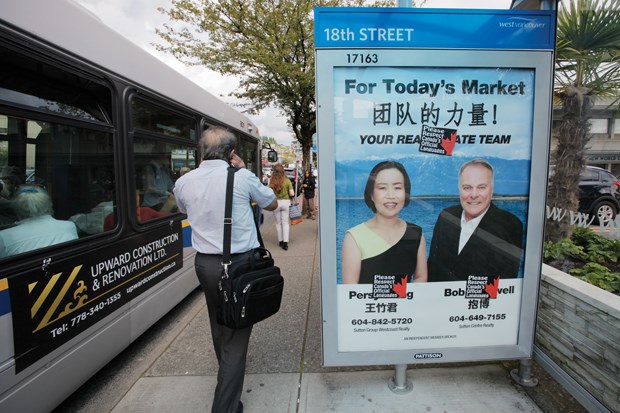A North Shore resident who is part of an organization that's complained about Chinese language advertising signs in other Lower Mainland communities is taking aim at similar signs on West Vancouver bus shelters.
Brad Saltzberg, a North Vancouver resident and spokesperson for the group Putting Canada First, is taking issue with bus shelter advertisements along Marine Drive that have prominently featured messages in the Chinese language.
The signs also feature English.
But Saltzberg said he's offended by the proliferation of signs in non-official languages, which he said undermines "traditional English and French Canadian identity."
Saltzberg recently wrote to West Vancouver council about the issue after noting several advertisements featuring Chinese displayed on West Vancouver bus shelters. Signs have included ads for real estate agents, financial planning and food products.
"If it goes on unchecked it will continue to the degree we're seeing in other business districts and other municipalities whereby No. 3 Road in Richmond, it looks like Hong Kong. It doesn't look like Canada."
If the trend continues, he said, "Our whole city will appear to be Asian."
Last week, someone placed square stickers on the signs reading "Please Respect Canada's Official Languages."
West Vancouver's bus shelters are owned by the Pattison Group, which sells advertising space on them, under an agreement with the municipality.
The company controls the content of the ads, which is guided by Canadian advertising standards, said Donna Powers, spokesperson for the District of West Vancouver.
"We have talked to them about vulgarity and sexual suggestiveness but not about language," she said, noting West Vancouver's sign bylaw doesn't cover language.
Nobody from Pattison returned calls from the North Shore News.
West Vancouver Mayor Michael Smith said he doesn't see any problem with the ads.
"I believe in personal freedom. If you pay your money you should be able to advertise your sign in any language you want. I'm not a racist. I
don't see why anybody would be offended by an advertisement in a different language," he said.
"There's some people who would like to turn the clock back 50 years when all the immigrants to Canada came from Europe. It's a different world."
Smith said as someone who believes in individual freedom, "I don't have
a lot of tolerance for the nannies and the higher purpose people who like to tell everybody else how they should think and what they should do."
Elizabeth Jones, executive director of the North Shore Multicultural Society, said she's not surprised that advertising signs have recently become a flashpoint in the Lower Mainland.
"I think signage is a big issue," she said. "It triggers a lot of feelings people have about change and immigration.
"A lot of racism and a lot of feelings about the change that's taking place in communities is unspoken. When you get signage, it is right there.
"We all grow up within a certain culture and community the way it is,"
said Jones. "Some people are better at adapting to change than others."
In April, Saltzberg's group successfully mounted a campaign to get the social service agency SUCCESS to pull its Chinese-only ads from Richmond bus shelters.
"I'm proud to say I've never believed in multiculturalism for even one minute of my life," said Saltzberg.
According to the last Census data, more than 26 per cent of the North Shore population lists a language other than English or French as their first language.
Farsi, Mandarin, Cantonese, other Chinese languages and Korean are the most common languages spoken after English.



